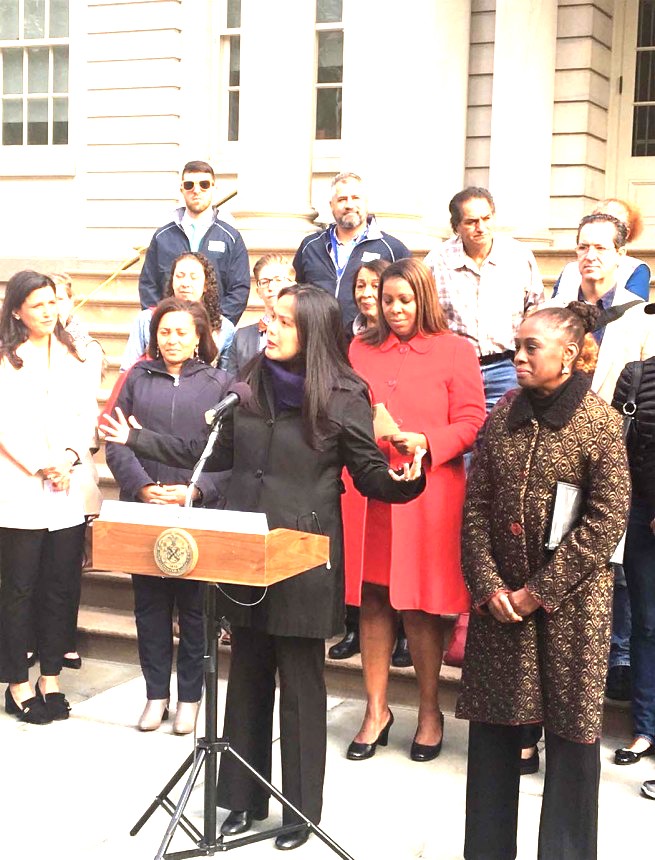New York first US city to ban questions on job-seekers’ pay histories

First lady Chirlane McCray (right), Human Rights Commissioner Carmelyn P. Malalis (speaking at podium) and other key NYC leaders heod a rally at City Hall to celebrate the salary history nondisclosure law going into effect. AJPRESS
NEW YORK– This city on Tuesday, October 31 became the first municipality in the nation to enforce a law prohibiting all employers from inquiring about job seekers’ salary history during the hiring process, including on job applications and in interviews.
By removing questions about an applicant’s previous earnings, the law allows applicants who have been systemically underpaid, particularly women and people of color, to negotiate a salary based on their qualifications and earning potential rather on their previous salary.
Mayor Bill de Blasio signed the bill into law in May. First lady Chirlane McCray, Public Advocate Letitia James, Human Rights Commissioner Carmelyn P. Malalis and other key NYC leaders held a rally Tuesday at City Hall to celebrate the law going into effect.
“New York City is taking a decisive step forward in the fight for equal pay. This new law will help to end the cycles of structural racism and sexism that have held women and people of color back for too long, and create a fairer City for all New Yorkers,” said Mayor Bill de Blasio.
Say goodbye
“Today, we say goodbye to the much-dreaded question that forces too many women and people of color to continue working at an unfairly low wage, job after job. Beginning today, employers in New York City who ask job applicants to share their salary history are breaking the law. And NYC will hold them accountable; because people should be paid based on the skills and qualifications they bring to a job, not the size of their last paycheck,” said first lady Chirlane McCray, co-chair of the Commission on Gender Equity.
“Equal pay for equal work is a basic human right and today, New York City takes a critical step towards achieving it,” said Public Advocate Letitia James. “By banning questions about salary history, we are putting a stop to an employment practice that perpetuates gender wage discrimination and hurts all New Yorkers. I’m proud that New York is the first city in the country to officially ban this practice and ensure we are doing all we can to support women as we work to build a society where every individual has the opportunity to realize their full potential.”
Closing the wage gap
“The salary history ban will help finally close the wage gap, especially for women and people of color, and I am proud that New York City is the first municipality to take this big step forward,” said Council Speaker Melissa Mark-Viverito. “I thank the Mayor, the First Lady, Public Advocate James, and Council Member Elizabeth Crowley for their hard work in making sure that no New Yorker is disadvantaged by their salary history.”
“Women and people of color deserve to be paid what they’re worth, not held back by their current or previous salary,” said Chair and Commissioner of the NYC Commission on Human Rights Carmelyn P. Malalis. “Today’s law will enable job seekers to negotiate a fair salary based on their skills and will help break the cycle of income inequality that has been so prevalent in the workforce for so long. We are proud to enforce this law and are actively engaging business communities and advocates to make sure everyone understands their rights and obligations under the Law.”
Nationally, women earn 80 cents for every dollar that men earn, according to U.S. Census Bureau. In New York City, women earn $5.8 billion less than men in wages each year, according to a report by New York City’s Public Advocate Tish James’ office, a disparity that’s even greater for people of color.
Black women vs. white men
Black women in New York City make just 55 cents for every dollar a white man makes while Hispanic women make just 45 cents. Nationally, black men earned 73 percent of white men’s hourly earnings in 2015, according to the Pew Research Institute, while Hispanic men earned 69 percent. This translates to average hourly wages for black and Hispanic men of $15 and $14, respectively, compared with $21 for white men.
The law, which will be enforced by the NYC Commission on Human Rights, makes it illegal for both public and private employers in New York City to inquire about a job applicant’s salary history during the hiring process, including:
- Asking applicants questions about or soliciting information in any way about applicants’ current or prior earnings or benefits, including on job applications.
- Asking applicants’ current or former employers or their employees about applicants’ current or prior earnings or benefits.
- Searching public records to learn about applicants’ current or prior earnings or benefits.
- Relying on information about applicants’ current or prior earnings or benefits to set their compensation.

